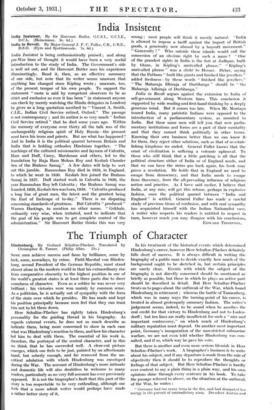India Insistent
India Insistent. By Sir Harcourt Butler, G.C.S.I., G.C.I.E., D.C.L. (Heinemann. 3s. 6d.)
India in Revolt. By Major-General J. F. C. Fuller, C.B., C.B.E., D.S.O. (Eyre and Spottiswoode. 7s. 6d.) India Insistent is being enthusiastically praised ; and along pre-War lines of thought it would have been a very useful introduction to the study of India. The Government's side is well set out, and Sir Harcourt Butler uses his experience illuminatingly. Read it, then, as an effective summary of one side, but note that its writer seems unaware that anything has changed since Kipling wrote ; unaware, too, of the present temper of his own people. To support the statement " caste is said by competent observers to be as strict and exclusive as ever it has been " (a statement anyone can check by merely watching the Hindu delegates in London) he gives us a long quotation ascribed to Vincent A. Smith, C.I.E., Indian Civil Service retired, Oxford." The passage is not contemporary ; and its author is so very much " Indian Civil Service retired " that he died some years ago. Within the memory of everyone over thirty all the talk was of the unchangeably religious spirit of Holy Russia—the peasant must have his icons and priests. But see what has happened ! And in India it is the political quarrel between Britain and India that is holding orthodox Hinduism together. The teachings of the cultured missionaries and laymen of Calcutta, Hare and Duff, Carey, Marshman and others, led to the foundation by Raja Ram Mohun Roy and Keshab Chander Sen of the Brahmo Samaj.". A few dates will help to sort out this jumble. Rammohan Roy died in 1833, in England, to which he went in 1830. Keshab Sen joined the Brahmo Samaj in 1857. Duff started work in Calcutta in 1830, the year Rammohan Roy left Calcutta ; the Brahmo Samaj was founded, 1828, Keshab Sen was horn, 1838. " Calcutta produced a long line of great men, the latest and the greatest being the Earl of Inchcape of to-day." There is no disputing concerning standards of greatness. But Calcutta " produced "
Warren Hastings, to mention no other name. Gokhale, ordinarily very wise, when irritated, used to indicate that the goal of his people was to get complete control of the administration." Sir Harcourt Butler thinks this was very
wrong : most people will think it merely natural. "India is allowed to impose a tariff against the import of British goods, a generosity now abused by a boycott movement." " Generosity ! " Who outside these islands would call the concession of an obvious right by such a name ? " One of the grandest sights in India is the fort at Jodhpur, built by titans, in Eipling's unrivalled phrase." " Kiplines unrivalled phrase " was a cliché to Homer. Heber, saying that the Pathans " built like giants and finished like jewellers" added freshness— by those words finished like jewellers." " The Maharaja Dhiraja of Durbhurga " should be " the Maharaja Adhiraja of Durbhanga."
India in Revolt argues against the extension to India of self-government along Western lines. This conclusion it supported by wide reading and first-hand thinking by a deeply 'generous mind. But it comes too late. When Mr. Montagu toured India, many patriotic Indians were opposed to the introduction of a parliamentary system, as unsuited to India. But these same men will tell you that now parlia- mentary institutions and forms are a part of their mentality and that they cannot think politically in other terms. ' Knowing their own business better than we can know it, for them, they reject other solutions, such as that of re-estab:-' lishing kingdoms we ended. General Fuller knows that the crust of civilization is suffering a volcanic upheaval. To those who still think that a little patching is all that the political structure either of India or of England needs, and that we can have the status quo back again, his book may prove a revelation. He holds that in England we need to escape from democracy, and that India needs to escape from theocracy, from the all-pervading influence of religious notion and practice. As I have said earlier, I believe that India, at any rate, will get this release, perhaps in explosive fashion, once the political quarrel between " India and England " is settled. General Fuller has made a careful study of previous times of confusion, and with real sympathy has acquainted himself with the Indian Nationalist case. A writer who respects his readers is entitled to respect in turn, however much you may disagree with his conclusions.
ED WARD THOM PSON.










































 Previous page
Previous page